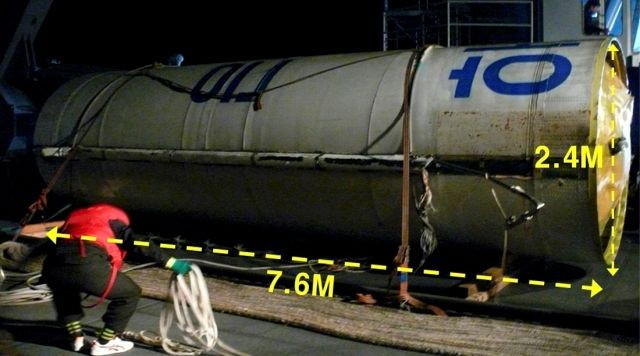South Korea Claims To Have Found North’s Rocket Debris As Pyongyang Celebrates Success

South Korea’s Navy is claiming it retrieved debris from a long-range rocket that North Korea launched on Wednesday, while Pyongyang’s state media reported mass rallies to celebrate the launch.
Less than two hours after the launch, a South Korean Aegis destroyer deployed in the Yellow Sea discovered an object, believed to be part of a fuel container from the first stage of the rocket, near the trajectory announced by Pyongyang, South Korea’s Yonhap news agency reported Friday.
The 3.2-ton upper part of the first stage rocket, which was inscribed with the rocket's name "Unha," was lying on the Cheong Hae Jin ship, with a bundle of wires on the surface of the container, the report said. Reporters were allowed to observe the debris on board the ship, the images of which were published by news agencies.
A joint investigation team comprising military officials and scientists will examine the object.
In Pyongyang, soldiers attended a mass rally organized to celebrate the launch's success as top officials hailed the launch and praised the "bravery and wisdom" of young leader Kim Jong-un.
Kim stressed the need "to launch satellites in the future ... to develop the country's science, technology and economy," according to the North's official Korean Central News Agency (KCNA).
By placing a satellite in orbit, North Korea "showed at home and abroad the unshakable stand ... to exercise the country's legitimate right to use space for peaceful purposes," Kim was quoted as saying by the KCNA.
It was North Korea's first successful use of a three-stage rocket to put a satellite into orbit.
North Korea has tried five times to launch a satellite since 1998. An attempt to launch the Unha-3 rocket in April, as part of a celebration to mark the 100th birthday of the nation’s founder, Kim Il-Sung, failed after about 100 seconds of powered flight.
The U.N. Security Council Wednesday condemned the launch, saying it constituted a test of a long-range missile technology that is banned under the U.N.'s resolutions.
The council warned North Korea -- which is already subject to international sanctions for its 2006 and 2009 attempts to test a nuclear device -- of possible measures in response as countries including South Korea and Japan pressed for stronger sanctions against Pyongyang.
South Korea's Defense Ministry had earlier said that the satellite was orbiting normally at a speed of 4.7 miles per second, though it usually takes about two weeks after liftoff to determine whether a satellite works successfully. The ministry added that it was not able to determine the nature of the mission the satellite was performing.
North Korean space officials had said that the satellite would be used to study crops and weather patterns.
However, reports questioning the claims of the success of the launch arose Thursday when unnamed U.S. officials told NBC News that the object that Pyongyang put into its orbit appeared to be “tumbling out of control.”
The vehicle is in an uncontrolled orbit around the Earth, and officials weren’t sure what the spacecraft's purpose and capabilities were, the report said.
© Copyright IBTimes 2024. All rights reserved.






















